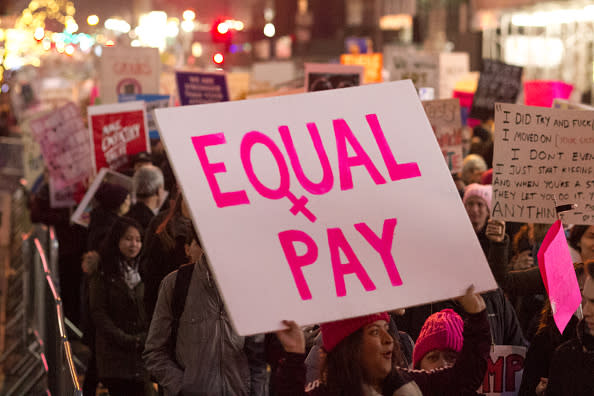It will take 202 years to close the gender pay gap, study finds

Want equal pay between men and women? At this rate, it won’t happen until 2220, according to a new study.
That’s right: Women have to wait 202 years.
A report from the World Economic Forum found that the differences in economic opportunity between men and women are so vast that it will take generations to correct.
The study is based on an “economic opportunity gap,” which factors in workforce participation, pay and advancement. Overall, gender disparity across politics, work, health and education improved by less than 0.1 percent, Bloomberg reports.
“What we’re seeing globally is that we don’t have any country that’s achieved gender equality, regardless of level of development, region or type of economy. Gender inequality is the reality around the world, and we’re seeing that in all aspects of women’s lives,” Anna-Karin Jatfors, the regional director for UN Women, told Bloomberg. “202 years is too long a wait.”
According to the @wef:
-It could take 202 years for women to reach economic equality
-Women make 63% what men make for the same work
-Women earn 50% less than men each year.
-Just 34% of global managers are womenLooks like we have a lot of work to do. https://t.co/kHwonCwFDA
— Abigail Hess (@AbigailJHess) December 18, 2018
The 2018 Global Gender Gap Report examines equality and progress between countries because “gender parity is fundamental to whether and how economies and societies thrive.” This annual report studies 145 countries and marks their progress toward gender parity in four categories: economic opportunity, education, health and political empowerment.
The World Economic Forum estimates that the health gap is nearly closed and the education gap will be closed within the next 14 years.
But full political and economic equality will take more than a century, if not two. The forum says women make just 63 percent to what men make for the same work. One of the biggest barriers contributing to this chasm is the lack of leadership opportunities available to women.
“The equal contribution of women and men in this process of deep economic and societal transformation is critical,” said Klaus Schwab, executive chairman of the World Economic Forum. “More than ever, societies cannot afford to lose out on the skills, ideas and perspectives of half of humanity.”
How close are we to closing the gender gap? Read our new report: https://t.co/90p7ZVI155 #gendergap18 pic.twitter.com/MQLtT0kMA1
— World Economic Forum (@wef) December 17, 2018
